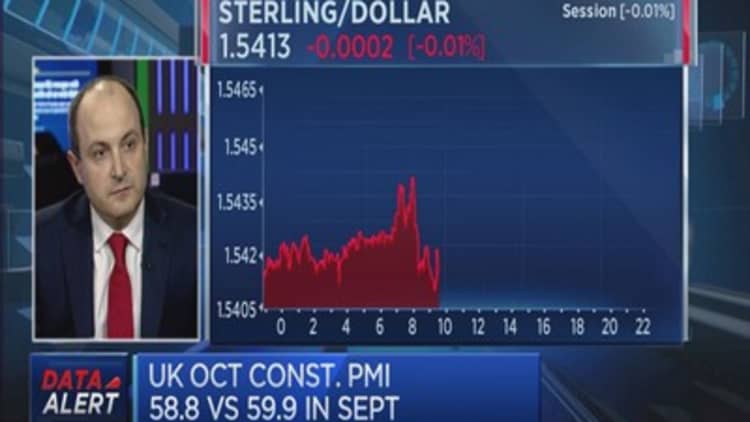Remember, remember, the fifth of November, the old rhyme about the U.K.'s Bonfire Night goes. This year, the anniversary of the Gunpowder Plot, an abortive plan to blow up Parliament by disgruntled Catholics, comes with potential fireworks from an unlikely source – the Bank of England.
The second-ever of the Bank's so-called Super Thursdays (where the interest rate decision and inflation report are released at the same time) is more likely to be a damp squib.
The bank is not expected to raise interest rates until February 2016 at the earliest, with some economists predicting that the first rise in interest rates could come even later in the year. The base rate has been at 0.5 percent since March 2009, as part of the extraordinary measures produced by monetary policymakers aimed at limiting the impact of the credit crisis.
Yet some surprises could still emerge. A 7-2 split on the nine person Monetary Policy Committee (MPC) which sets interest rates, rather than the expected 8-1, would definitely move expectations of an interest rate hike. Martin Weale and Kirsten Forbes are believed to be the most likely members to join Ian McCafferty in voting to raise rates slightly.
Amateur detectives in the markets will also be, as usual, studying Governor Mark Carney's unflappable exterior and guarded statements closely for any clues about how the MPC's thinking is evolving.
"Communication will matter significantly, and the MPC is likely to tread lightly in the direction of hawkishness," Richard Cochinos, currency strategist at Citi, wrote in a research note.
There is currently a disconnect between what many traders, pricing in no hike until 2017, and economists, who are more likely to forecast a February/May 2016 hike, think will happen.

Since the MPC last issued an inflation report – essentially its most detailed economic forecast - there have been several reasons to be more gloomy. Economic growth in both the U.K. and worldwide is slower than hoped for. Business confidence has fallen to a two and a half year low, according to the Markit/CIPS UK services purchasing managers' index.
Still, growth in construction, services and manufacturing was promising in October, and there have been improvements in unemployment and wage gains, plus a slight weakening in sterling. Over the next few months, inflation will also be affected by the removal of the dramatic decline in oil prices – when the annual comparison is with a period when the oil price drop had already begun rather than when prices were still riding high, inflation should be higher and closer to the MPC target of 2 percent.
As the majority of the MPC want to wait for inflation to rise before they proceed, this should be where any potential for a few sparklers lies.




